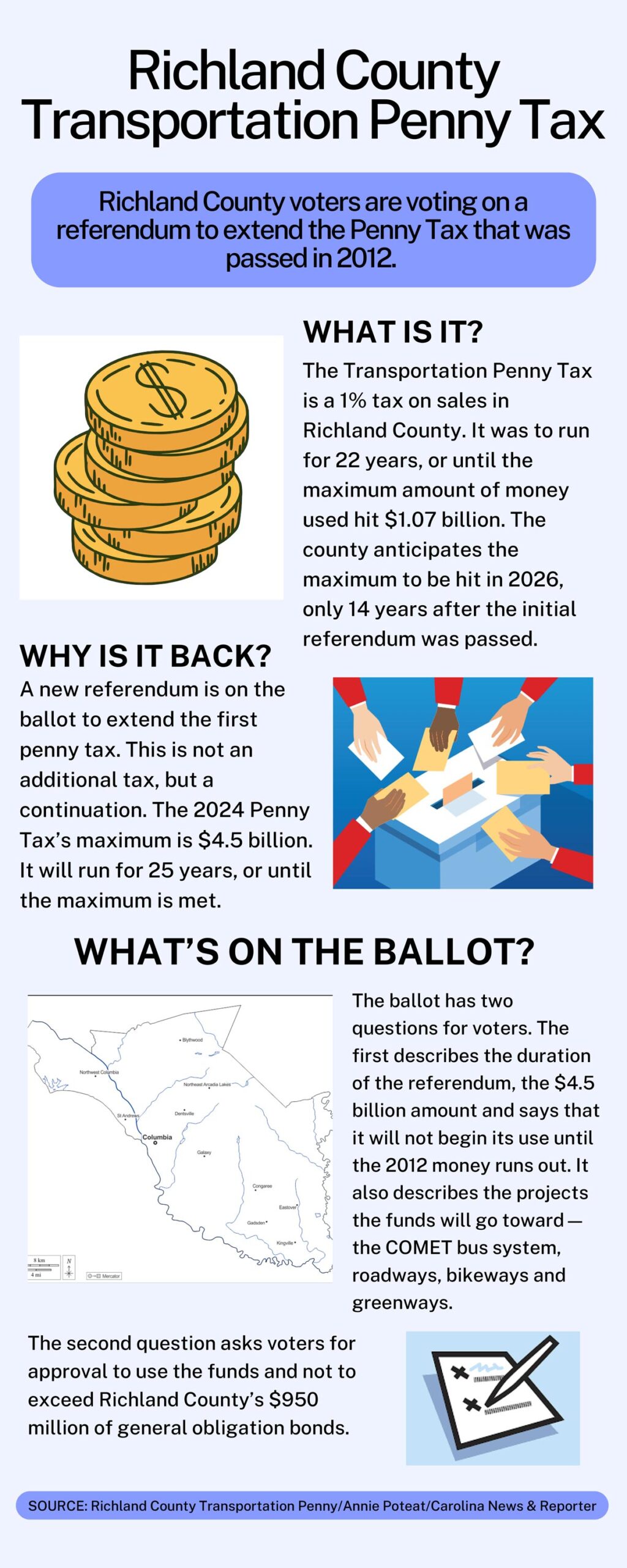Construction on Hardscrabble Road is partially paid for by the Richland County Transportation Penny Tax. (Photo by Annie Poteat/Carolina News & Reporter)
Mary Grants is a 70-year-old retired nurse living in Blythewood.
She voted for the Richland County Transportation Penny Tax when it was first on the ballot in 2012.
But this time around, Grants is voting against the referendum.
“I’m not really in favor of it because I haven’t seen any evidence of the money that was passed years ago, being used,” Grants said.
Richland County voters had the choice of renewing the penny tax in the 2024 election. It’s a 1% tax on sales in the county that has funded transportation projects for roadways, the COMET bus system, bikeways, greenways and walkways since 2012.
Voters in favor of the referendum were in the lead as of 2:20 p.m. on Wednesday, with 148 of 149 precincts reporting. Votes in favor of extending the tax stood at 106,238, and those against, 67,047. The response to the second question on the ballot was reporting totals just below those numbers.
“On behalf of The COMET staff, drivers, and the countless individuals who rely on our services for transportation to work, healthcare, education, and day-to-day activities, thank you Richland County residents for the trust you have placed in us through your positive referendum vote at the ballot box,” the COMET bus system wrote in a Wednesday press release.
The release also said the referendum would help expand its bus routes and their frequency and allow work to be done on its infrastructure.
The 2024 referendum will collect money for 25 years or until $4.5 billion is collected.
The maximum budget from the 2012 referendum is $1.07 billion. The tax is to run for 22 years or until that number is met. But the county estimates the money will all be spent by late 2026, so a 2024 referendum to extend the tax is on the ballot for voters.
Projects not yet completed from the first referendum will be done before starting new ones from the second tax, according to the county’s Transportation Penny website.
USC law school Professor Richard Willis voted in support of the Transportation Penny Tax on Tuesday at St. John Neumann Catholic Church.
“I think it’s a fair way to raise taxes,” Willis said. “And I think our property taxes are high and a burden on some people, and so sales tax is a fair way of doing it. Because it’s a tax, it can be avoided if someone doesn’t want to buy something. And I think we need good money on our roads.”
Richland County has been hosting public informational sessions featuring council members to try and increase the transparency of the tax’s spending.
And advocates have been lobbying voters hard.
There are bright green and orange signs that read ‘Keep Our Penny / Vote Yes,’ lining the streets throughout the county. And Columbia Mayor Daniel Rickenmann, a Republican, also sent texts to residents advocating for the 2024 referendum.
Still, like Grants, some who voted for the referendum in 2012 are voting against it this time.
Michael Gauthreaux is from Columbia. He said he was in favor of the tax in 2012. But he said after he saw it in action, turned against it. The county has “abused” the program, Gauthreaux said.
Elsewhere in South Carolina, Charleston, Dorchester and Berkeley counties have a transportation sales tax.
Counties cannot have a specific transportation tax if they already have another “local option sales tax.” In those cases, they may have a capital project sales tax, which can go in part or completely for transportation.
These counties have a capital project sales tax: York, Newberry, Orangeburg, Aiken, Florence, Chester, Lancaster, Bamberg, Lee, Marion, Colleton, Allendale, Barnwell, Greenwood, Horry, McCormick, Williamsburg, Spartanburg, Calhoun, Saluda, Edgefield and Laurens.
Carolina News & Reporter staffers Cassie Cornwell and Mary Gaughan contributed to this reporting.




